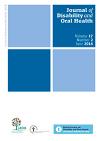Journal of Disability and Oral Health

- Cover Date:
- June 2016
- Print ISSN:
- 1470-8558
- Vol:
- 17
- Issue:
- 2
X-linked hypophosphatasia, a battle to save the dentition: a review and case report of a patient’s journey highlighting the effects of x-linked hypophosphatasia on the dentition and possible dental..
Introduction
Hypophosphatemic rickets represents a group of inheritable disorders with very similar features. Currently there are three known forms of inheritance: autosomal dominant (ADHR), autosomal recessive (ARHR) and Xlinked dominant (XLH) (Souzar et al., 2010). The phenotype of X-linked hypophosphatasia (XLH) was first described in
1937 by Albright. X-linked hypophosphatasia (XLH), previously referred to as vitamin D-resistant rickets and
familial hypophosphatemic rickets (Batra et al., 2006; Carpenter et al., 2011), although rare is the most common
form of inherited rickets, with an estimated incidence of about 1 in 20,000 births (Yuan et al., 2008; Whyte, 2009; Carpenter et al., 2011). The basic physiological defect in XLH is impaired proximal renal tubular reabsorption of phosphate. It is characterised by low serum alkaline phosphatase activity (Whyte, 2009; Carpenter et al., 2011). This leads to many abnormalities of bone and other mineralised tissues including those of the dentition. The genetic basis for XLH is loss-of-function of PHEX (Phosphate regulating gene with Homology to Endopeptidases located on the X chromosome). PHEX is a member of the M13 family of neutral endopeptidases, which activate or degrade peptides, is expressed in bones and teeth, and localises to the cell surface (Yuan et al., 2008; Whyte, 2009; Carpenter et al., 2011).
Key words: X-linked hypophosphotasia, restorative, dentistry, endodontics, prevention
Doi: 10.443/JDOH/Truman_06
- Article Price
- £15.00
- Institution Article Price
- £0.00
- Page Start
- 98
- Page End
- 103
- Authors
- A D Truman, L D Addy, L A Blackburn
Articles from this issue
- Title
- Pg. Start
- Pg. End
- Raising the Body Mass Index (BMI) limit for day procedure units: results of an audit in Belfast
- 72
- 77
- Introduction of a Nomad Pro hand held dental x-ray unit for radiography in a special care setting
- 78
- 91
- The influence of a postgraduate qualification (Diploma/Master) in Sedation or Special Care Dentistry on work practices and career progression
- 92
- 97
- X-linked hypophosphatasia, a battle to save the dentition: a review and case report of a patient’s journey highlighting the effects of x-linked hypophosphatasia on the dentition and possible dental..
- 98
- 103
